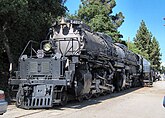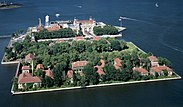From today's featured article
The history of timekeeping devices dates back to ancient civilizations observing astronomical bodies. Sundials and water clocks originated in ancient Egypt, while incense clocks were used in China. Mechanical clocks were developed in medieval Europe after the invention of the bell-striking alarm; Henry de Vick built a mechanical clock around 1360 that was the basis for improvements in timekeeping for the next 300 years. The mainspring, invented in the 15th century, allowed small clocks to be built. Leonardo da Vinci produced the earliest drawings of a pendulum. The pendulum clock, designed by Christiaan Huygens in 1656, was more accurate than other mechanical timekeepers. The electric clock, invented in 1840, controlled the most accurate pendulum clocks until the 1940s, when quartz timers became the basis for precise measurement of time and frequency. Atomic clocks are the most accurate timekeeping devices in practical use today and are used to calibrate timekeeping instruments. (Full article...)
Did you know ...
- ... that Union Pacific 4014 (pictured) has been the only Big Boy locomotive operating in the United States since 2019?
- ... that the first fictional depiction of the moons of Mars predates their discovery by a century and a half?
- ... that in Mother and Child, composed in 2002 by John Tavener for the vocal ensemble Tenebrae, organ and temple gong enter for the climax?
- ... that the 2022 Cure Bowl is the only one of the 2022–23 NCAA football bowl games scheduled to be played between FBS conference champions?
- ... that Burton Raffel called Arthur Cooper's translation of a poem by Du Fu "exceedingly lame"?
- ... that Minnesota legislator Claudia Meier cosponsored a bill freeing women from having to take their husbands' last names, and then took her husband's last name?
- ... that at the height of the war between Iraq and the Islamic State, diplomats of the Philippine embassy in Baghdad agreed to die together rather than be taken hostage?
- ... that all three of playwright Oliver Hailey's Broadway productions closed after one regular performance?
In the news
- Croatia changes its national currency from the Kuna to the Euro to become the 20th member state of the Eurozone, and also joins the European passport-free zone, the Schengen Area.
- Pope Emeritus Benedict XVI (pictured) dies at the age of 95.
- Brazilian footballer Pelé dies at the age of 82.
- A winter storm causes record-breaking low temperatures and leaves more than 90 people dead across North America.
On this day
January 1: Public Domain Day; Solemnity of Mary, Mother of God (Roman Rite Catholicism)
- 1739 – Bouvet Island in the South Atlantic Ocean, the most remote island in the world, was discovered by French explorer Jean-Baptiste Charles Bouvet de Lozier.
- 1773 – The hymn "Amazing Grace" was probably first used in a prayer meeting in Olney, England, without the music familiar to modern listeners.
- 1892 – The immigration station on Ellis Island (pictured) in New York Harbor opened, and would process almost 12 million immigrants to the United States over the course of its existence.
- 1928 – Joseph Stalin's personal secretary, Boris Bazhanov, crossed the Iranian border and defected from the Soviet Union.
- 1998 – Argentinian physicist Juan Maldacena published a landmark paper initiating the study of AdS/CFT correspondence, which links string theory and quantum gravity.
- Lorenzo de' Medici (b. 1449)
- Eugène-Anatole Demarçay (b. 1852)
- Shirley Chisholm (d. 2005)
Today's featured picture

|
|
Schloss Favorite is a maison de plaisance and hunting lodge built in the Baroque style in Ludwigsburg, Germany. It is located on a rise, directly north of Ludwigsburg Palace and connected via an avenue to it. This panorama of Schloss Favorite, taken in January 2017, was stitched from eight separate photographs captured from the avenue linking it to the palace. The building is shown in a snow-covered clearing in the woods, framed by bare trees lining the avenue. Photograph credit: Julian Herzog
Recently featured:
|
Other areas of Wikipedia
- Community portal – The central hub for editors, with resources, links, tasks, and announcements.
- Village pump – Forum for discussions about Wikipedia itself, including policies and technical issues.
- Site news – Sources of news about Wikipedia and the broader Wikimedia movement.
- Teahouse – Ask basic questions about using or editing Wikipedia.
- Help desk – Ask questions about using or editing Wikipedia.
- Reference desk – Ask research questions about encyclopedic topics.
- Content portals – A unique way to navigate the encyclopedia.
Wikipedia's sister projects
Wikipedia is written by volunteer editors and hosted by the Wikimedia Foundation, a non-profit organization that also hosts a range of other volunteer projects:
-
Commons
Free media repository -
MediaWiki
Wiki software development -
Meta-Wiki
Wikimedia project coordination -
Wikibooks
Free textbooks and manuals -
Wikidata
Free knowledge base -
Wikinews
Free-content news -
Wikiquote
Collection of quotations -
Wikisource
Free-content library -
Wikispecies
Directory of species -
Wikiversity
Free learning tools -
Wikivoyage
Free travel guide -
Wiktionary
Dictionary and thesaurus
Wikipedia languages
This Wikipedia is written in English. Many other Wikipedias are available; some of the largest are listed below.
-
1,000,000+ articles
-
250,000+ articles
-
50,000+ articles



